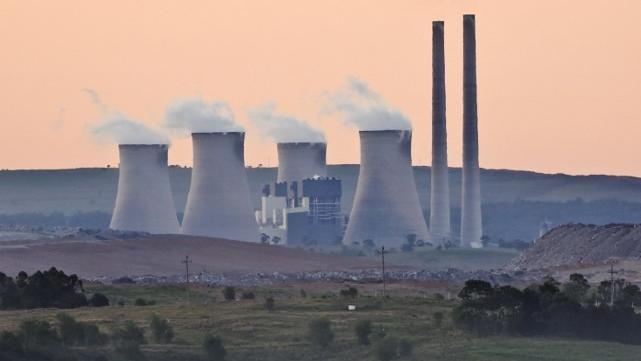 This photo taken on Nov 18, 2015 shows coal being produced at an open-cut mine in the Hunter Valley region, New South Wales, Australia. (WILLIAM WEST / AFP)
This photo taken on Nov 18, 2015 shows coal being produced at an open-cut mine in the Hunter Valley region, New South Wales, Australia. (WILLIAM WEST / AFP)
Sixty percent of the world’s current oil reserves and fossil methane gas and 90 percent of coal should remain in the ground if the world is to have half a chance of limiting global warming to 1.5 degrees Celsius by 2050, according to a new modeling study.
The authors of the study titled “Strict fossil fuel extraction limits needed to meet 1.5 degrees Celsius warming limit” say the decline in oil and gas production required globally by 2050 implies that many regions face peak production now or during the next decade.
The authors of the study titled “Strict fossil fuel extraction limits needed to meet 1.5 degrees Celsius warming limit” say the decline in oil and gas production required globally by 2050 implies that many regions face peak production now or during the next decade
They added that many operational and planned fossil fuel projects are not conducive to meeting internationally agreed climate targets.
“It is estimated that oil and gas production, for example, must decline by three percent annually until 2050 to meet these goals. Policies to restrict production and reduce demand will be needed to encourage producers to reassess production,” reads the study, which was published in the scientific journal Nature on Sept 9.
Fossil fuels account for 81 percent of the global energy consumption, but their production and use will need to decline substantially to meet internationally agreed climate goals, set out by the Paris Agreement in 2015, to limit global warming to 1.5 degrees relative to pre-industrial times.
In 2015, a Nature paper estimated that a third of oil reserves, half of gas reserves and more than 80 percent of coal reserves should remain unused by 2050 to have a good chance of capping global warming at 2 degrees Celsius.
ALSO READ: UN sounds 'deafening' warning on climate change
The new study concluded that a large increase in unextractable fossil fuel reserves will be required, particularly for oil of which an additional 25 percent of reserves must stay in the ground compared with the 2015 estimates.
The authors also find the decline in oil and gas production required globally by 2050 implies that many regions face peak production now or during the next decade. Moreover, the authors suggest that these results may be an underestimate as their model does not consider future Earth system feedbacks and given the uncertainties around the rate of deployment and scale of technologies needed to counteract emissions.
Commenting on the study, Professor Frank Jotzo, director of the Centre for Climate Economics and Policy at the Australian National University's Crawford School of Public Policy, said: “Humanity is not running out of coal, oil or gas; instead, we are running out of options for the waste product carbon dioxide.
“This study is a reminder of just how little room there is for the continued use of fossil fuels, if the world is to succeed in limiting global warming to levels that might be safe. This is not a new insight, with shrinking carbon budgets having been computed for many years.”
He said what the study shows is the comparison between the known reserves of fossil fuels and the amounts that could still be burned.
ALSO READ: Floods lay bare Europe's 'gigantic task' in averting climate damage
“The picture is stark, in particular for the major coal producers including Australia, where most coal deposits will need to remain untouched. And this is largely out of the hands of the fossil fuel producing countries,” Jotzo said.
How much coal will still be exported from Australia depends on how quickly importing countries move to clean energy, he added.
Rebecca Colvin, senior lecturer at the ANU’s Crawford School of Public Policy, said the global transition of the energy system from fossil fuels to low- or no-emissions sources will have significant effects on the regional communities with economies buoyed by the fossil fuel sector.
She said the study highlights the need for an “open and honest discussion” in Australia about equipping those regions, which are dependent on fossil fuels, for the “global energy transition”.
Professor John Quiggin, Australian Laureate Fellow in Economics at the University of Queensland, said: “One implication of this report is that we should stop talking about ‘fossil fuels’ and ‘renewable energy’.”
These terms arose in the 1970s when the main concern was that the world might run out of carbon-based fuels like oil, gas and coal, Quiggin said.
READ MORE: Global ice melt matches worst-case climate scenario, study says
“Coal is the most dangerous, because it creates deadly particulate pollution when it is burned, as well as emitting carbon dioxide. Methane gas, a hydrocarbon emits less carbon dioxide when it is burned, but is itself a potent greenhouse gas.
“We need to replace them with clean carbon-free energy sources including solar, wind, and hydroelectricity. The fact that these sources are renewable is welcome, since it implies that they provide a long-term solution, but not the primary reason we need them,” he added.
Professor Matthew England, Scientia Professor at the Climate Change Research Centre, University of New South Wales, said: “The results of this study are unambiguous – ongoing fossil fuel extraction and burning will deny us any chance of a safe climate future”.


